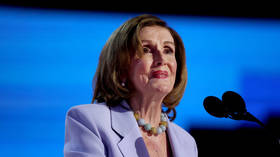Ultimate argument? ‘Rogue PM’ Johnson to renege on key parts of Brexit deal, ‘taking N. Ireland hostage’
With trade talks with the EU stalled, Boris Johnson’s government is considering reneging on key commitments under the withdrawal agreement, potentially opening a can of political snakes.
With only weeks left to seal a deal on future trade relations with the European Union, the UK will up the ante and go for the “nuclear option”. Legislation currently prepared by the government will walk out on key provisions in the Withdrawal Agreement signed last October, stripping their legal force, the Financial Times reported on Monday. The plan was confirmed later in the day by the Johnson cabinet.
One piece, the Internal Market Bill, which is due to be revealed on Wednesday, will force UK courts to prioritize national law over commitments to the EU. Under the agreement, London has to notify Brussels on any state-aid decisions affecting Northern Ireland’s goods market and ensure that businesses located there file customs paperwork when trading with the rest of the UK. The Finance Bill coming in autumn will undermine another part of the Brexit deal, which covers payment of tariffs on goods shipped to Northern Ireland.
Also on rt.com Not afraid to walk away: Top UK negotiator warns EU it’s not scared of a no-deal BrexitSpecial provisions for Northern Ireland were adopted to prevent a return of border checks with the Republic of Ireland and were meant as a stopgap, pending the negotiations on a future trade regime with the EU. With hopes for a breakthrough dwindling, the Johnson government is angling for a de facto no-deal Brexit, a scenario that haunted his predecessor Theresa May last year. The Prime Minister argued last week that turning our back on Brussels would allow Britain to “prosper mightily” and is expected to set a mid-October deadline for the talks.
The promised stunt left many in Britain and beyond stunned and dismayed. The Daily Mirror's Kevin Maguire called Johnson “a rogue PM” and a “cynical charlatan”, who would rip up a Parliament-approved international commitment, tarnishing Britain’s reputation as a reliable partner.
Johnson’s a rogue PM, threatening to flout an international treaty and risk peace in Ireland by ripping up an EU exit approved by Parliament. Discussing on @GMB in a mo the cynical charlatan showing to neighbours, allies and trading partners he can’t be trusted
— Kevin Maguire (@Kevin_Maguire) September 7, 2020
Labour politician Andrew Adonis said such a move would be “an act of reckless irresponsibility without precedent in modern British government” because it would breach the 1998 Good Friday Agreement, which ended decades of violence in Northern Ireland.
The consequence of Johnson’s latest desperate manoeuvre would be a hard border in Ireland and a fundamental breach of the Good Friday Agreement - an act of reckless irresponsibility without precedent in modern British government
— Andrew Adonis (@Andrew_Adonis) September 7, 2020
Irish Foreign Minister Simon Coveney remarked that overriding the Withdrawal Agreement would be a “very unwise way to proceed”. German MEP Manfred Weber rebuked Johnsons for attempting to take “Northern Ireland hostage again” and wondered if the British leader’s word can be even trusted.
Prime Minister, there is no such thing as a good outcome in #Brexit. Instead of taking Northern Ireland hostage again, it would be better that you keep your word and stand by the Withdrawal agreement. Can we trust you keep your word? https://t.co/cblembBTVz
— Manfred Weber (@ManfredWeber) September 7, 2020
Some commenters wondered if London walking away from its international commitments would be a credible excuse for Scotland to again bid for independence. There is strong sentiment in that part of the UK that divorcing the EU was not in the best interests of the Scottish people and that a rerun of the 2014 referendum would produce a different outcome now.
Dear @BorisJohnson if you can walk away from the Withdrawal Agreement. Then we Scots can walk away from the Act of Union 🏴
— Patch Bruce 🏴 (@patch8652) September 7, 2020
Others jumped at the opportunity to mock Johnson for his mercurial stance on how Brexit should be done properly.
Johnson: “Theresa May’s Withdrawal Agreement is terrible and I have no option but to resign.”Also Johnson: “My virtually identical Withdrawal Agreement is fucking brilliant. Vote for me!”Still Johnson: “Lol, just fucking with you. It really is a monumentally shitty deal.”
— 🏳️🌈 Max 🏳️🌈 (@SpillerOfTea) September 7, 2020
The plan however found strong supporters in the hard pro-Brexit corner, where any compromise with the EU was considered wrong in the first place. “No deal, no problem and No Deal is always better than a bad deal,” cheered the Brexit Party chair, Richard Tice. David Campbell Bannerman of UKIP said politicians in Brussels were to blame for the stalled trade talks so “they shouldn’t complain if that WA [Withdrawal Agreement] is reformed”.
EU in breach of good faith in trade deal negotiations, so @BorisJohnson totally correct to override certain parts of Withdrawal Agreement. No deal, no problem and No Deal is always better than a bad deal. Lets Go, WTO. https://t.co/gCK0LAhMOZ
— Richard Tice (@TiceRichard) September 7, 2020
It seems to me that if the EU acts unreasonably in blocking a free trade agreement, as it is currently, then it is in direct breach of the Withdrawal Agreement, so they shouldn’t complain if that WA is reformed - and our payout withheld. https://t.co/kiC3gf0jBM
— David C Bannerman (@DCBMEP) September 6, 2020
If you like this story, share it with a friend!














